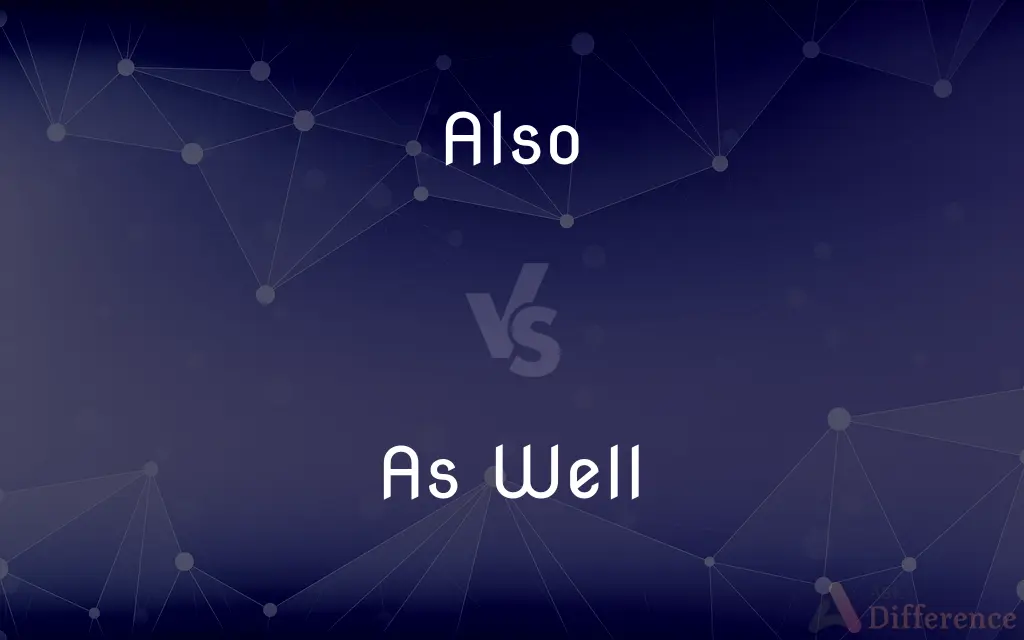Also vs. As Well — What's the Difference?
Edited by Tayyaba Rehman — By Maham Liaqat — Published on March 8, 2024
"Also" is used to add information in a sentence, often placed at the beginning or middle, while "as well" typically concludes a sentence, emphasizing inclusion.

Difference Between Also and As Well
Table of Contents
ADVERTISEMENT
Key Differences
"Also" is a versatile adverb that integrates additional information within sentences, enhancing clarity and coherence. It is commonly positioned after the subject and before the verb in a sentence, or after the modal or auxiliary verb, serving to introduce new points or similarities in discussion.
"As well" usually appears at the end of a sentence, acting as a conversational tool to include something or someone else into the previously mentioned category. It often carries a tone of afterthought or supplementary addition, subtly differentiating it from "also" in its emphasis on inclusion rather than addition.
Both "also" and "as well" are used to add information, while their placement within a sentence significantly affects the flow and emphasis of the conversation. "Also" may appear more formal or written in context, whereas "as well" often aligns with spoken English or informal writing, reflecting a slight nuance in usage preference.
The choice between "also" and "as well" can subtly change the tone of a sentence. "Also" might be preferred in academic or professional writing for its straightforward addition of information. In contrast, "as well" could be chosen for its gentle, inclusive quality, particularly in casual conversations or when echoing a prior statement for emphasis.
Understanding the context and desired emphasis can guide the appropriate use of "also" and "as well." While they are interchangeable in many instances, paying attention to sentence structure and the intended nuance can enhance communication effectiveness, making the message more tailored and clear to the audience.
ADVERTISEMENT
Comparison Chart
Position in Sentence
Often at the beginning or middle
Typically at the end
Usage Context
Formal and informal writing, versatile placement
More common in spoken English or informal writing
Function
Adds information or similarities
Emphasizes inclusion or an afterthought addition
Tone
Can be neutral or formal
Often carries a more casual or inclusive tone
Example Sentence
"She enjoys painting, and she also loves to travel."
"He plays the guitar, and he sings, as well."
Compare with Definitions
Also
Also is used to introduce an additional point or item.
I need to buy milk, and also bread.
As Well
It can emphasize a final addition or thought.
Make sure to lock the doors, as well.
Also
It can link similar ideas or items in a list.
She's a talented musician who also writes her own songs.
As Well
As well is used to add something to a previously mentioned list at the end of a sentence.
Bring your swimsuit, and a towel, as well.
Also
In formal writing, also adds supplementary information clearly.
This policy also affects subcontractors.
As Well
As well subtly conveys a sense of completion or rounding off a list.
We need to finalize the report and send it to the team, as well.
Also
Also often precedes the verb or follows the auxiliary/modal verb.
He can also play the piano.
As Well
As well often appears in conversational or informal writing.
I'm going to the concert, and I'm volunteering there, as well.
Also
Also can start a sentence to add emphasis or introduce a related point.
Also, we should consider the budget constraints.
As Well
It implies inclusion or an addition to what has been said.
She'll be joining us for dinner, as well.
Also
In addition; besides.
Also
Likewise; too
If you will stay, I will also.
Also
In addition; besides; as well; further; too.
Everyone had eggs for breakfast, but Alice also had toast.
Also
(obsolete) To the same degree or extent; so, as.
Also
In addition; besides; as well; further; too.
Lay up for yourselves treasures in heaven . . . for where your treasure is, there will your heart be also.
Also
Even as; as; so.
Also
In addition;
He has a Mercedes, too
Common Curiosities
Can "also" start a sentence?
Yes, "also" can start a sentence to add emphasis or introduce a new, related point.
Can "as well" be used in the middle of a sentence?
It's uncommon and might seem awkward; "also" is usually better for mid-sentence additions.
Is "as well" more casual than "also"?
Yes, "as well" is often perceived as more casual and is more common in spoken English.
Is "as well" appropriate for formal writing?
While not incorrect, "also" might be preferred in formal writing for its clearer, more direct addition of information.
Is there a difference in emphasis between "also" and "as well"?
Yes, "also" straightforwardly adds information, while "as well" often implies an afterthought or inclusion.
Can "also" and "as well" be used interchangeably?
Yes, in many contexts, but their placement in a sentence differs.
How does the placement of "also" and "as well" affect sentence structure?
"Also" is flexible and can be placed near the beginning or middle, while "as well" is typically used at the end of a sentence.
Do "also" and "as well" have the same meaning?
Their core function of adding information is the same, but their usage and placement carry different nuances.
Is it grammatically correct to end a sentence with "as well"?
Yes, it's grammatically correct and common in spoken and informal English.
Are there situations where "also" or "as well" should not be used?
Both are widely applicable, but their use should align with sentence structure and desired tone.
How do I decide whether to use "also" or "as well"?
Consider the formality of the context and where in the sentence you're adding information.
Can "also" be used in lists?
Yes, "also" can link items in a list or introduce additional points.
Can "also" replace "as well" at the end of a sentence?
It's possible but might alter the casual or inclusive tone that "as well" provides.
Can the use of "also" or "as well" change the meaning of a sentence?
Not the core meaning, but it can influence the sentence's flow, emphasis, and perceived formality.
How do "also" and "as well" function in compound sentences?
They can link clauses or lists, with "also" often within clauses and "as well" at the sentence's end.
Share Your Discovery

Previous Comparison
Availability Heuristic vs. Representative Heuristic
Next Comparison
Flat Water vs. Still WaterAuthor Spotlight
Written by
Maham LiaqatEdited by
Tayyaba RehmanTayyaba Rehman is a distinguished writer, currently serving as a primary contributor to askdifference.com. As a researcher in semantics and etymology, Tayyaba's passion for the complexity of languages and their distinctions has found a perfect home on the platform. Tayyaba delves into the intricacies of language, distinguishing between commonly confused words and phrases, thereby providing clarity for readers worldwide.
















































